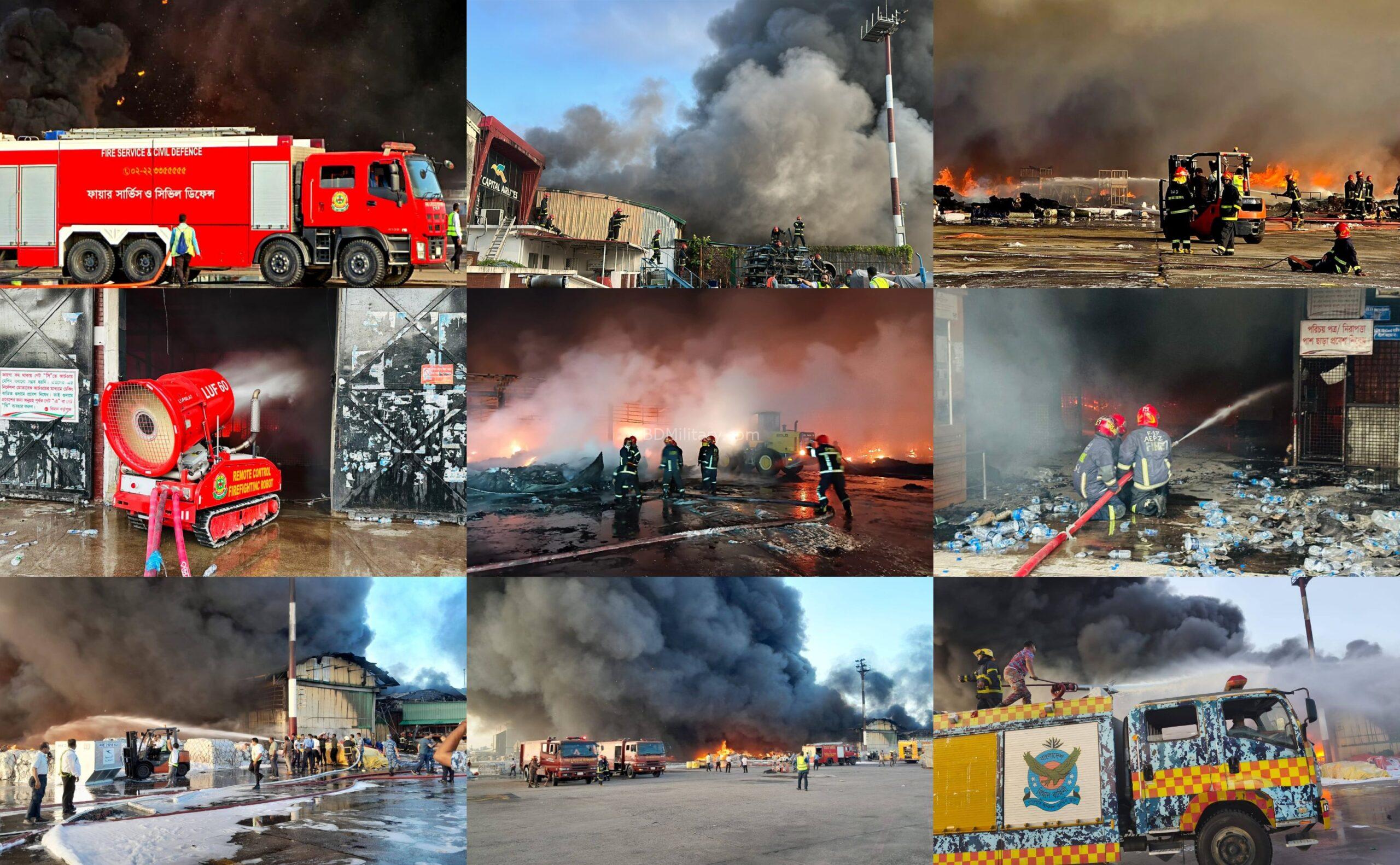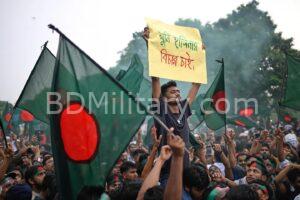The devastating blaze that engulfed the cargo complex of Dhaka’s Hazrat Shahjalal International Airport on 18 October has become more than an infrastructural or economic incident. To the country’s security community, it symbolises a potential turning point — one that exposes Bangladesh’s vulnerability to internal subversion, hybrid warfare, and political manipulation.
While the government has launched multiple investigations to determine the cause, the timing, targets, and cascading impact of the fire have fuelled speculation among strategic analysts that the event may not have been accidental. It has revived long-standing concerns over politically motivated sabotage, with suspicions pointing towards elements linked to the former ruling network and their foreign backers.
A Critical Node Under Fire
The fire, which tore through warehouses containing imported goods, export consignments, and industrial materials, paralysed the nation’s air cargo operations for several hours. Flights were suspended, export schedules disrupted, and preliminary estimates from business associations suggested that the economic impact could exceed one billion US dollars.
For a country whose export economy depends on the timely movement of readymade garments and high-value goods, the assault on its primary logistics hub has direct national security implications. The disruption not only affects trade and revenue but also public confidence, investor sentiment, and the perception of stability — all of which are crucial in the months leading to the 2025 general elections.
Emerging Suspicion: Political Sabotage and Strategic Timing
Although no official conclusion has been reached, intelligence observers point to a pattern of recent fires at sensitive locations — from export processing zones to key industrial estates — raising suspicions that the incidents may be linked. The airport fire’s timing, so close to the political transition period, appears calculated to maximise disruption.
Security analysts interviewed by defence forums note that the Awami League’s residual networks within civil, administrative, and security sectors remain extensive. Some of these figures, reportedly under investigation, may be capable of influencing or facilitating such acts from within. The aim, according to these assessments, would be to create widespread insecurity and erode public confidence in the interim government, thereby generating conditions conducive to military intervention or political bargaining.
This theory aligns with what counter-intelligence specialists describe as a “controlled crisis strategy” — a sequence of orchestrated destabilisation acts designed to trigger emergency governance, reminiscent of Bangladesh’s 2007 caretaker crisis.
Foreign Intelligence Context and Indian Factor
The incident has also reignited debate over external influence in Bangladesh’s internal politics, particularly regarding the role of Indian intelligence. Delhi, long accustomed to having deep operational access within Dhaka during the Awami League’s tenure, is perceived by some analysts to be uneasy with the current strategic realignment under the Yunus-led interim administration.
A recent visit by an Indian Army Military Intelligence delegation to Dhaka, reportedly led by a major general, has been cited by regional observers as indicative of heightened Indian interest in Bangladesh’s security direction. Though officially described as a routine liaison, its timing — amid domestic unrest and infrastructure sabotage — has prompted speculation that New Delhi may be attempting to leverage elements within Bangladesh’s military or bureaucracy to shape political outcomes favourable to its interests.
Both the United States and China are said to be monitoring these developments closely. Western analysts note that Washington is unwilling to tolerate any interference that could derail the democratic transition, while Beijing’s economic stakes in Bangladesh’s infrastructure give it a parallel interest in maintaining stability. For both powers, Dhaka’s sovereignty and equilibrium have become a geopolitical balancing point in South Asia.
Government Response and Security Posture
In an unusually firm statement on 18 October, the Chief Adviser’s Press Wing warned that “any credible evidence of sabotage or arson will be met with a swift and resolute response.” It added that no act of criminality or provocation would be allowed to disrupt public life or the political process.
Within hours, the Ministry of Finance established a five-member committee to assess the economic losses, while a separate seven-member team began a forensic inquiry into the cause of the fire. The DGFI and NSI have reportedly been instructed to coordinate with the Armed Forces Division and Fire Service Intelligence Unit to trace possible patterns of coordinated attacks.
BNP leader Mirza Fakhrul Islam Alamgir called upon citizens to remain alert, echoing public sentiment that the recent fires — including the one at the airport cargo section — might be linked. He warned that domestic and international conspirators were still active in their efforts to destabilise the nation.
Strategic Implications
The fire at HSIA is more than an isolated security lapse. It reflects how infrastructure vulnerability can be exploited in hybrid political warfare. Bangladesh’s logistics network — from ports to airports — is an easy target for both political sabotage and intelligence signalling, where a single act can send shockwaves through the economy and test the credibility of the government.
If evidence does point towards deliberate sabotage, the interim government will face the difficult task of neutralising embedded networks while maintaining civil-military balance. Any perceived attempt by foreign actors to manipulate this process could further strain regional relationships, forcing Dhaka to harden its intelligence posture and redefine its national security doctrine.
The situation also underscores the need for Bangladesh to modernise its critical infrastructure protection policy. Fire and sabotage at the country’s economic lifelines should now be treated as acts of national security threat rather than civil incidents — requiring coordinated response from military, intelligence, and civil defence agencies.
Conclusion
The Dhaka Airport fire has laid bare the intersection of economic vulnerability, political intrigue, and regional intelligence rivalry. Whether it proves to be an accident or an act of sabotage, its implications reach far beyond the tarmac of Shahjalal International.
For Bangladesh, the coming months will determine whether the state can resist both internal destabilisation and external manipulation. The interim government’s response — decisive, transparent, and grounded in national unity — will define not only its immediate legitimacy but the direction of Bangladesh’s sovereignty in a rapidly shifting regional landscape.

Khaled Ahmed is a seasoned former intelligence analyst and military expert from the Netherlands, bringing over 15 years of specialised experience in operational intelligence, threat analysis, and strategic defence planning. Having served in high-level, classified roles within Dutch military intelligence, he possesses rare expertise in European security architecture, NATO doctrine, and asymmetric warfare. Khaled’s deep operational insight and international perspective enable him to deliver precision-driven intelligence analysis and forward-looking strategic forecasts. A trusted contributor to high-level risk assessments and security briefings, he offers readers clarity on complex defence and security challenges. Khaled leads the National Security and Fact Analysis sections at BDMilitary. He holds a Master’s degree in International Relations from the University of Groningen, The Netherlands, and is fluent in Dutch, French, and Arabic — combining linguistic dexterity with operational expertise to analyse security issues across cultures and regions.


